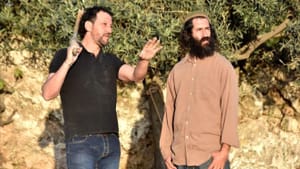Stay in the Loop
BSR publishes on a weekly schedule, with an email newsletter every Wednesday and Thursday morning. There’s no paywall, and subscribing is always free.
Talking across the divide
Philadelphia Jewish Film Festival 2017: Rabbi Mordechai Vardi's 'The Field'

Rabbi Mordechai Vardi’s documentary The Field (in Hebrew and Arabic with English subtitles) shines a bright light on the dark divide separating Palestinians and Israelis. Two peoples claim the same land. Both are married to origin myths that have kept them from accepting one another for nearly a century.
Born into bloodshed
The story unfolds in Gush Etzion, a cluster of settlements in the West Bank whose history is steeped in blood. Originally, the land was purchased by Jews and became an agricultural settlement in 1940. When war broke out immediately following the establishment of Israel, 127 Gush Etzion residents were massacred by Arabs.
In the 20 years between the massacre and the West Bank again coming under Israeli control in 1967, Gush Etzion became a rallying cry, glorified in song and poetry. Its current residents are not the secular, leftist, or moderate Israelis of Tel Aviv. They are hardline, right-wing True Believers. The international community, as led by the United Nations, considers Israeli settlements in the West Bank illegal under international law; the Israeli government disputes this.
The documentary starts in 2014; tensions have rarely been higher. Three Israeli teenagers were kidnapped from the Gush Etzion bus stop and found murdered in a field outside of Hebron. Later, lone Palestinians attack Jews with knives at the same bus stop.
Signs of hope
It’s not exactly the best time to sing “Kumbaya.” Yet that is what Ali Abu Awwad, a Palestinian resident of Gush Etzion, is determined to do. He invites his Orthodox Jewish neighbors to his field and, in flawless Hebrew, speaks to them of the importance of opening a dialogue of nonviolence, mutual acceptance, and understanding.
As Awwad bares his soul, speaking of visiting his mother in an Israeli jail as a child, of losing his brother during the Second Intifada to an Israeli bullet, the camera pans the settlers’ faces. Most have never had a conversation with a Palestinian, other than the cashier at the local supermarket. Here is an Arab, the enemy, chipping away at a wall that was built to keep him out. Some are moved to tears. Others still resist.
When Awwad addresses students from a military academy in Jerusalem, encouraging them to have compassion for the Palestinians with whom they will interact, their contempt is blatant. Following the film, Vardi, an Orthodox Jewish rabbi, stated that he was not a peace activist when he started the project. But he is now.
Unless you’ve been in a coma since January, you are aware that the divide in our own country is nearly as volatile as this one in the Middle East. That said, perhaps this Thanksgiving we would do well to take a cue from Rabbi Vardi. Instead of arguing with those whose politics doesn’t match your own, aim for peaceful coexistence. It’s good for the digestion.
What, When, Where
The Field. Directed by Rabbi Mordechai Vardi. Philadelphia Jewish Film Festival. November 6, 2017, at the Lightbox Film Center. International House, 3701 Chestnut Street, Philadephia. Pjff.org.
Sign up for our newsletter
All of the week's new articles, all in one place. Sign up for the free weekly BSR newsletters, and don't miss a conversation.
 Stacia Friedman
Stacia Friedman